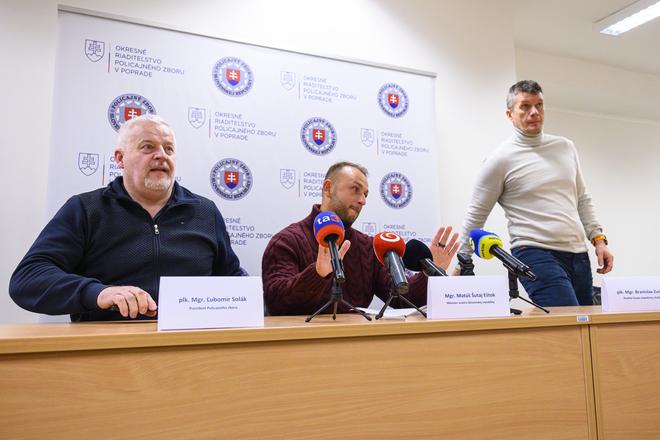In the wake of a tragedy in Spišská Stará Ves, where a student fatally stabbed a teacher and a classmate, Police Corps Chief Ľubomír Solák stepped down over the weekend.
“I agreed with him on the immediate termination of his role as police chief,” announced Interior Minister Matúš Šutaj Eštok, leader of the ruling coalition party Hlas, during a press briefing at a police station in Poprad, eastern Slovakia, on Saturday, November 18.
Solák sat silently beside Šutaj Eštok, a posture reminiscent of their joint press conferences over the past year. The minister confirmed that Deputy Police Chief Rastislav Polakovič would temporarily lead the police until a new chief is appointed.
The head of the local police in Spišská Stará Ves, northeastern Slovakia, has also been dismissed. Šutaj Eštok justified the decision by citing findings from the Interior Ministry’s Police Inspectorate, which revealed that the local unit had failed to implement adequate preventive measures despite being aware of the dangerous behaviour of the student involved in the attack.
A brief and controversial tenure
Solák’s tenure as police chief lasted just 414 days. Appointed on December 1, 2023, his rise to the role came as a surprise to many, given his relatively low profile. He had previously served with Bratislava City Police and worked in the police force from 2012 to 2015, including a stint in the Special Task Unit. His first departure from the force in 2015 followed a contentious training exercise at the construction site of Rázsochy hospital in Bratislava, during which live ammunition was used, reports daily Sme. Then-interior minister Robert Kaliňák (Smer) reportedly requested his resignation.
As police chief, Solák faced criticism for his vague communication style. Observers noted that the minister often whispered responses to Solák during their joint appearances, highlighting the police chief’s passive presence.
In January 2024, Solák’s leadership drew scrutiny when police refused to release footage of a traffic incident involving Deputy Speaker of Parliament Andrej Danko (SNS), ultimately categorising the case as a minor infraction. Under his watch, the National Crime Agency (NAKA), tasked with tackling organised crime and corruption, was disbanded and replaced by the Office for Combating Organised Crime. The true aim was to sideline investigators probing corruption cases that led to individuals with links to previous Smer-led administrations. The government framed the move as police reform. Controversies further mounted when police mishandled cases such as the fatal beating of a homeless man by an officer in Košice. Calls for Solák’s dismissal intensified but were initially ignored.
A shadow of uncertainty
Rumours about Solák’s departure began circulating in late 2024. Independent MP Martina Bajo Holečková claimed on social media that he planned to resign and be replaced by Branislav Zurian, the current head of the Police Inspection unit – a claim denied by the Interior Ministry.
Similar speculation surrounded police deputy chief Ivan Hapšták, responsible for criminal police and migration issues. Despite denials, his resignation was announced abruptly at the end of 2024.
Solák’s future remains unclear. While Šutaj Eštok proposed promoting him to the rank of general – a move approved by the government last September – President Peter Pellegrini has yet to decide on the matter. Why Solák should receive such a distinction is a mystery.
The interior minister himself is set to face a no-confidence motion in parliament in February, with accusations stemming from a series of critical issues. The motion follows the attempted assassination of Prime Minister Robert Fico (Smer), escalating chaos within the police force, bomb threats targeting schools, and allegations of police brutality.


 Pictured from right: Police Inspectorate Director Branislav Zurian, Interior Minister Matúš Šutaj Eštok (Hlas), and Police Chief Ľubomír Solák during a short press briefing in Poprad, eastern Slovakia, on January 18, 2025. (source: TASR - Michal Svítok)
Pictured from right: Police Inspectorate Director Branislav Zurian, Interior Minister Matúš Šutaj Eštok (Hlas), and Police Chief Ľubomír Solák during a short press briefing in Poprad, eastern Slovakia, on January 18, 2025. (source: TASR - Michal Svítok)